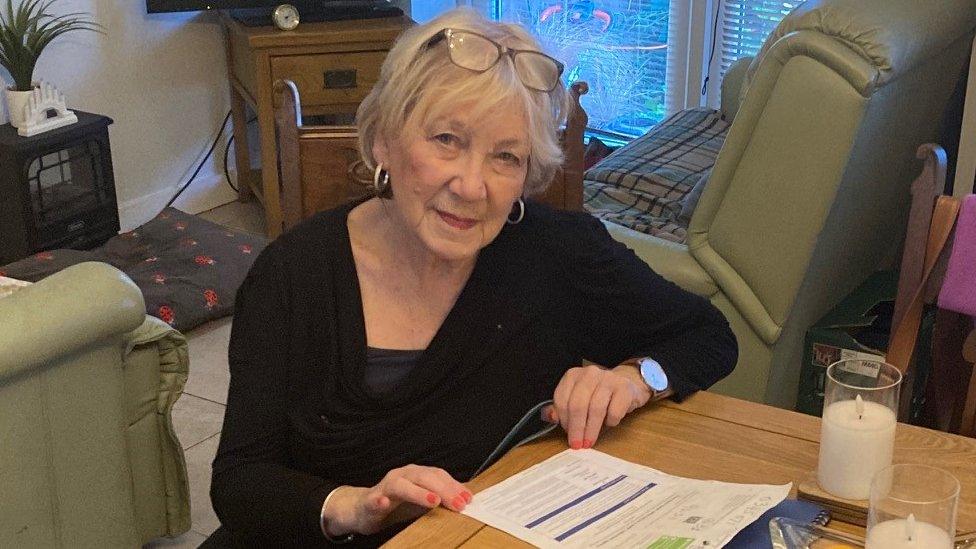Energy bills: 'I was forced onto a prepayment meter'
- Published
- comments

Audrey Risdon said her situation was not resolved until Citizens Advice became involved
Citizens Advice has called for a ban on energy companies "forcing" customers onto prepayment meters because they are struggling to pay bills.
The charity estimates that 3.2 million people in Britain ran out of credit on their prepayment meter last year, the equivalent of one every 10 seconds.
Audrey Ridson, 81, was switched to one even though she could not walk to the shop to top up her energy card.
Ministers said that energy firms must offer help to those struggling.
Some have meters installed, while others have smart meters automatically switched to prepayment mode.
People using prepayment meters pay for their gas and electricity by topping up their meter, either through accounts or by adding credit to a card in a convenience store or post office.
This is a more expensive method of paying than by direct debit, but is sometimes the only option for people who have struggled to pay and are in debt to an energy supplier. Many rented properties also have prepayment meters.
Problems can arise when residents no longer have any credit left on the meter, and have no money to top it up - leaving them unable to cook or heat their homes.
Audrey from Hampshire was in hospital recovering from a fall when her energy firm switched her to a prepayment account - even though her daughter-in-law warned her supplier that Audrey would struggle to get to the shops to make a payment to top up her meter.
"They [supplier] said: 'We've changed it over already to a card payment and you'll have to go to a local shop [to top up the meter]'. My daughter in law said: 'She won't be able to do that. She's got to have a special walking stick. She won't be able to get up to town'. And they didn't listen to her. It was dangerous to go up there for me because I had this injury.
"They charged me nearly £200 a month just for a shower and a light near my cooker," Audrey told the BBC.
She added that she had built up arrears whilst she was recovering in hospital from the fall.
Her issue was resolved only after she appealed to the charity Citizens Advice, she said.

Are you affected by issues covered in this story? Get in touch.
WhatsApp: +44 7756 165803, external
Tweet: @BBC_HaveYourSay, external
Please read our terms & conditions and privacy policy

Energy UK, which represents suppliers, said energy companies were required to have exhausted all other options before installing a prepayment meter, and would not do so for those "in the most vulnerable situations".
However, Citizens Advice said it saw more people who were unable to top up their prepayment meter last year than in the whole of the last 10 years combined.
In November, the BBC revealed how a rising number of households were having their energy smart meters remotely switched to prepayment meters.
Suppliers can use the technology to swap customers onto the prepayment method without their permission.
Citizens Advice is calling for a ban on this practice, as well as ruling out energy suppliers going into homes to fit prepayment meters, until more protection is put in place.
It gave the example of one of the charity's clients who said her power went off just before Christmas, and later discovered her meter had been switched to prepayment mode.
"I assumed it was a power cut. I had no way to make any calls, so my daughter and I were left in the dark all night with no heating, lights or means of making any food," she told the charity. This happened despite her energy company knowing she was vulnerable as a wheelchair user.

Why is this allowed and what can you do?
Before smart meters existed, energy firms would have to get a warrant to enter your home and physically install a prepayment meter
Now, smart meters enable energy firms to switch customers from direct debit payments to a prepayment meter system remotely
Ofgem rules state that energy suppliers must have effective checks and balances in place when switching the mode of a smart meter
The regulator advises customers with concerns to speak to their supplier. Under Ofgem rules they must offer payment plans you can afford and you can ask for emergency credit if you use a prepay meter and can't top up
Breathing Space, sometimes called the Debt Respite Scheme, is a free government scheme that could give you up to 60 days' space from creditors to set up a debt solution. Step Change debt charity can help you to apply, external
Citizens Advice offers this guide: Stop your energy supplier moving you to prepayment, external

The charity said it had heard other cases, including someone unable to top up their meter even though their medication needed to be refrigerated.
One in five of households that include someone who is disabled or long-term sick, which ran out of credit last year, went on to spend two days or more without an energy supply.
"The staggering rise in the cost of living means many simply cannot afford to heat and power their homes to safe levels," said the chief executive of Citizens Advice, Dame Clare Moriarty. The charity is calling for a total ban on forced prepayment meter conversion.
The energy regulator, Ofgem, stipulates that certain groups, such as disabled people and those with long-term health conditions, should not be forced on to a prepayment meter.
Ofgem and Citizens Advice said people could choose to move to prepayment if they wished.
Last year, the regulator wrote to suppliers about the issue.
A government spokesman said it expected energy suppliers to do all they could to help customers who were struggling to pay their bills. He added that Ofgem required companies to offer all prepayment customers in vulnerable circumstances some support, including emergency credit.
Simon Francis, coordinator of the End Fuel Poverty Coalition, said: "The staggering extent of the prepayment meters scandal is now clear," adding that a full ban on forced transition to them was the "only acceptable course of action".
But Dhara Vyas, deputy chief executive at Energy UK, said prepayment meters had long been a way of helping customers monitor and budget for their energy usage.
She added that suppliers were discussing the issue with government and the regulator - including looking at options to "reduce the price that prepayment customers pay".
- Published9 November 2022

- Published15 February 2024
